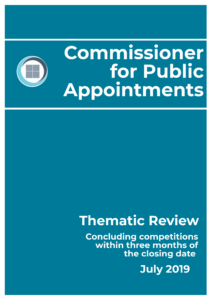Concluding competitions within three months of the closing date
Monday 1 July 2019

A timely and efficient public appointments system is essential to public confidence. Too often, what Sir Gerry Grimstone in his 2016 review called ‘customer care’, is not given the priority it should receive. Appointment processes can drag on for weeks, sometimes even months, with candidates being left in the dark – so a few, even successful ones, withdraw, and many others are disillusioned with the whole process. After all, candidates are usually busy people with lives to plan and other priorities in their work and home lives. The Cabinet Office’s Governance Code, published in 2016, set out a three month aim or aspiration between the final date for submitting applications and the announcement of the outcome. Rightly, a slightly less demanding timetable than originally proposed by Grimstone, which was between the start of a competition and its end.
A thematic review, conducted by my office, has sought to establish what has been happening. More than half of the appointment processes considered exceed the three months aspiration, on average by a further two months. Competitions that exceed the three month aim on average take roughly seven months to the announcement stage. While there can be problems up to the interview stage – for instance getting interview panels together – the longest delays occur between interviews and announcement. It is then that ministers, special advisers and departments can appear not fully to take into account the concerns of waiting candidates. Any failures to meet the three month aspiration and the frequent long, subsequent delays have a number of explanations but are unsatisfactory and inadequate as process and for the candidates involved.
Therefore I propose the following changes:
- To meet a legitimate concern of departments, the final date should be when successful and unsuccessful candidates are informed, not when an announcement is made since there is often a gap – which is nothing to do with the efficiency of the process. To ensure consistency and continuity of data, this change will come in at the start of the next reporting year; and will be in the annual report.
- Departments should arrange independent panel members and fix key dates before a competition is launched, while (in line with my report of March 2018 into the Office for Students) due diligence should be carried out before interviews are held.
- If a competition goes beyond the three month mark, candidates (that is the small number who have been interviewed) should be informed of the current state of play and of an expected date of completion, as should the office of the Commissioner for Public Appointments. My office will then monitor the process and consider whether to investigate the reasons for long delays.
- Good customer care and a positive experience of the process (even if unsuccessful) means talented candidates are more likely to stay interested and apply for other roles – and are more likely to encourage other people to consider applying for a board appointment too. I hope these changes will help focus departmental practice and make a difference to candidates.
Read the full thematic review (PDF, 12 pages, 193 KB)
Update: The Government responded to the Commissioner’s recommendations in November 2019.

